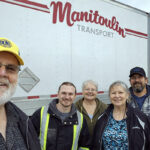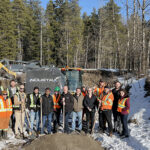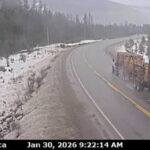Home »

Be a good neighbour – reform B.C. mining laws
Letter to the Editor
Last week all eight US Senators from Alaska, Washington, Montana and Idaho sent a letter expressing their concerns about the impact of B.C. mining to downstream watersheds in their states. Significantly, they called on British Columbia to reform its mining rules.
The people of Idaho and Montana are concerned about Elk Valley coal mine selenium pollution that threatens downstream water supplies and kills and deforms fish. The people of Alaska are upset that B.C. long-allowed the Tulsequah Chief Mine to release toxic acid mine drainage into a prized salmon watershed.
Many Americans are concerned that the mine waste storage dam technology that failed at Mount Polley Mine is now being replicated at a number of risky new B.C. mines along the Alaska border. And Washington State residents object that B.C. is poised to allow Imperial Metals — the company in charge of the Mount Polley Mine disaster — to drill in the headwaters of the Skagit River that supplies them with drinking water and chinook salmon.
No wonder all our neighbouring US Senators are demanding reform of B.C. mining laws; so are we. As British Columbians, we value nature, fresh water and healthy ecosystems. If our laws are strong enough, they can protect our water from pollution, ensure mine waste dumps do not put communities and watersheds at risk, and make sure mining companies pay to clean-up their mess. Right now, they don’t.
That’s why a number of B.C. community groups, public interest organizations, academics and First Nations have joined together to call for reform of BC mining laws. See https://reformbcmining.ca/reports/
We have proposed solutions to move B.C. toward more responsible mining. We want the Auditor General’s criticism of B.C.’s lack of adequate enforcement of mining rules addressed and remedied, including the need to safely retire 60 tailings dams at closed mines across the province. Our priorities are also to make sure the polluter pays, and that watersheds are protected through no-go zones or minimizing mine waste dumps along them.
As the Auditor General highlighted, there is a huge gap between mine reclamation security estimated and collected. Right now, unlike Alaska and Quebec, the B.C. government does not require mining companies to put all needed funds up front to pay for reclamation and mine cleanup. Yet it is widely recognized that full mine security improves environmental performance – and ensures that taxpayers don’t get stuck with the cleanup bill.
We also call on the government to set up an industry fund for victims of mine pollution, mine disasters and insufficiently cleaned-up mine sites. This kind of fund was instigated for the rail industry after the Lac Megantic disaster and for tanker oil spills after the Exxon Valdez disaster. Clearly, the First Nations and residents of Likely and Quesnel Lake should be able to get compensation for the clean water and fishing that they lost after the Mount Polley dam released mine waste into Quesnel Lake. This is an opportunity for the BC Government to develop a fund from the mining sector to help provide some justice and compensate pollution victims.
At the root of many conflicts around mining are the laws granting mining free, prior use of the land dating back to the 1860s. Staking for minerals can occur on private property, at municipal water sources and at key salmon habitat. Alaskans are concerned about exploration that has resulted in over 60 per cent of the Unuk watershed being staked on the B.C. side of the border. The staking for minerals can proceed without early engagement or consent from communities or First Nations which results in later conflicts, such as with the Ajax Mine in Kamloops or Taseko’s exploration in the Teẑtan Biny area of Tsihlqot’in territory.
Our mining claims legislation created in the gold rush era needs to be modernized, as other jurisdictions have done. The Mineral Tenure Act needs to be updated so that mining claims no longer undermine land-use planning, Indigenous rights, environmental protection and private property rights.
There are solutions that can reduce mining risks that will benefit British Columbians, our downstream neighbours, and the environment. We just need to implement them.
BC Mining Law Reform Coalition members:
Lars Sander-Green, Science and Communications Analyst, Wildsight;
Greg Knox, Executive Director, SkeenaWild Conservation Trust;
Christine McLean, Volunteer, Concerned Citizens of Quesnel Lake;
Gina Morris, Spokesperson, Kamloops Moms For Clean Air







